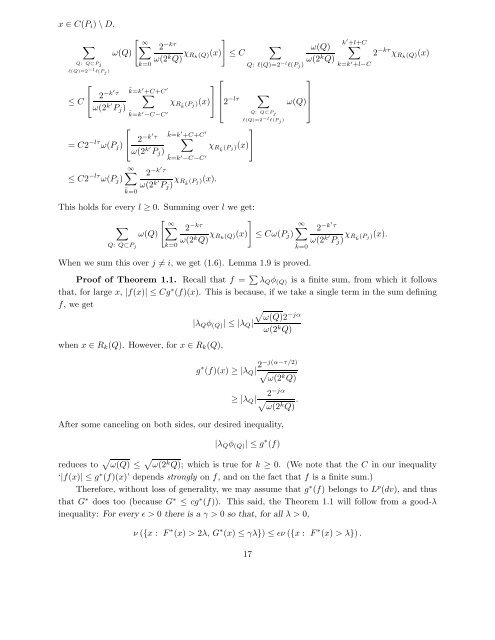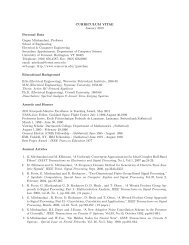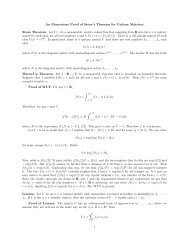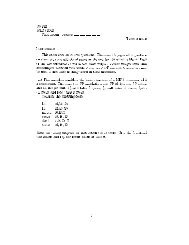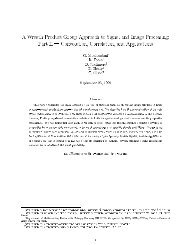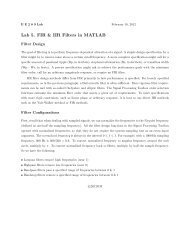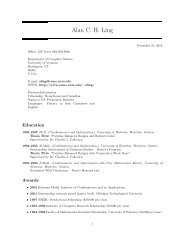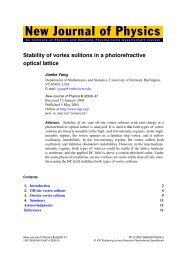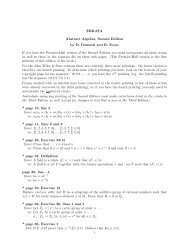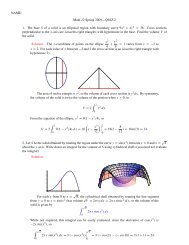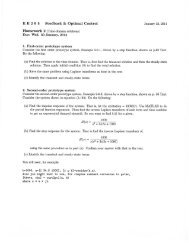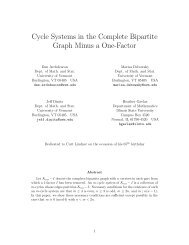Weighted inequalities for gradients on non-smooth domains ...
Weighted inequalities for gradients on non-smooth domains ...
Weighted inequalities for gradients on non-smooth domains ...
You also want an ePaper? Increase the reach of your titles
YUMPU automatically turns print PDFs into web optimized ePapers that Google loves.
x ∈ C(P i ) \ D,∑Q: Q⊂P jl(Q)=2 −l l(P j )ω(Q)[ ∞∑k=0]2 −kτω(2 k Q) χ R k (Q)(x) ≤ C⎡⎡⎤τ˜k=k ′ ∑+C+C ′≤ C ⎣2−k′ χω(2 k′ P j )R˜k(P j )(x) ⎦ ⎢˜k=k ′ −C−C ′⎡⎣ 2−lτ= C2 −lτ ω(P j ) ⎣χω(2 k′ P j )R˜k(P j )(x) ⎦˜k=k ′ −C−C ′≤ C2 −lτ ω(P j )∞∑˜k=02−k′ τ˜k=k ′ ∑+C+C ′2 −k′ τω(2 k′ P j ) χ R˜k(P j )(x).k=0∑Q: l(Q)=2 −l l(P j )∑Q: Q⊂P jl(Q)=2 −l l(P j )⎤ω(Q) ⎥⎦˜k=0ω(Q)ω(2 k Q)⎤k ′ ∑+l+Ck=k ′ +l−CThis holds <str<strong>on</strong>g>for</str<strong>on</strong>g> every l ≥ 0. Summing over l we get:[∑∞]∑ 2 −kτ∞∑ω(Q)ω(2 k Q) χ 2 −k′ τR k (Q)(x) ≤ Cω(P j )ω(2 k′ P j ) χR˜k(P j )(x).Q: Q⊂P jWhen we sum this over j ≠ i, weget(1.6). Lemma 1.9 is proved.2 −kτ χ Rk (Q)(x)ProofofTheorem1.1. Recall that f = ∑ λ Q φ (Q) is a finite sum, from which it followsthat, <str<strong>on</strong>g>for</str<strong>on</strong>g> large x, |f(x)| ≤Cg ∗ (f)(x). This is because, if we take a single term in the sum definingf, weget√ω(Q)2−jα|λ Q φ (Q) |≤|λ Q |ω(2 k Q)when x ∈ R k (Q). However, <str<strong>on</strong>g>for</str<strong>on</strong>g> x ∈ R k (Q),g ∗ (f)(x) ≥|λ Q | 2−j(α−τ/2)√ω(2k Q)2 −jα≥|λ Q | √ω(2k Q) .After some canceling <strong>on</strong> both sides, our desired inequality,|λ Q φ (Q) |≤g ∗ (f)reduces to √ ω(Q) ≤ √ ω(2 k Q); which is true <str<strong>on</strong>g>for</str<strong>on</strong>g> k ≥ 0. (We note that the C in our inequality‘|f(x)| ≤g ∗ (f)(x)’ depends str<strong>on</strong>gly <strong>on</strong> f, and <strong>on</strong> the fact that f is a finite sum.)There<str<strong>on</strong>g>for</str<strong>on</strong>g>e, without loss of generality, we may assume that g ∗ (f) bel<strong>on</strong>gs to L p (dv), and thusthat G ∗ does too (because G ∗ ≤ cg ∗ (f)). This said, the Theorem 1.1 will follow from a good-λinequality: For every ɛ>0 there is a γ>0 so that, <str<strong>on</strong>g>for</str<strong>on</strong>g> all λ>0,ν ({x : F ∗ (x) > 2λ, G ∗ (x) ≤ γλ}) ≤ ɛν ({x : F ∗ (x) >λ}) .17


